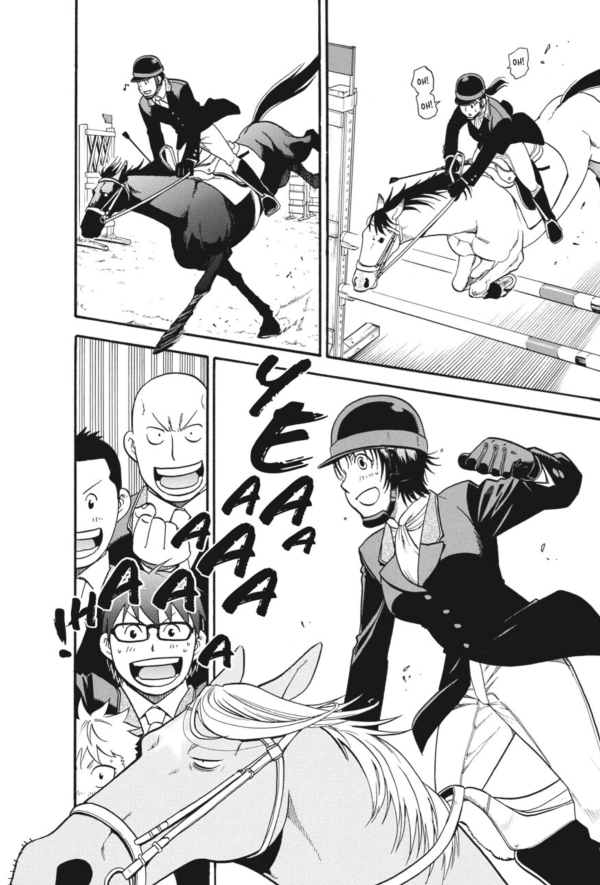Story & Art by Hiromu Arakawa
Translated by Amanda Haley
Lettered by Abigail Blackman

The seasons continue to pass as the thirteenth volume of Silver Spoon covers a large swatch of Hachiken and friends’ last year at Ooezo AG. These chapters particularly focus on Hachiken and Mikage’s last months in the Equestrian Club, reflecting on how far they’ve come and what they’ve accomplished along the way. Meanwhile, Hachiken and Ookawa continue to make strides in setting their pizza business up, figuring out their specialty and finding their first client before the volume’s end. While a lot of growth happens in these volumes, the series hardly takes a melancholy tone. On the contrary, Arakawa lays on the comedy and gags thick in this volume, subverting sentimentality at every turn, resulting in some of the funniest moments in the entire series!
Arakawa’s visual gags are particularly clever and inventive. Her sense of comedic pacing is brilliant, knowing just how long to let a scene play before delivering the punchline. Some of the best moments involve using contrasts to underscore a point. My favorite one of these moments is when Aikawa describes Mikage being flattered as like a pig being fattened up before slaughter, immediately cutting to the Komaba ranch to see that literal situation being played out. Some other stand-out jokes really make use of the conventions of comics to sell the joke. This best example of this is when Hachiken spits out milk through his nose and mouth when his brother Shingo tells him he’s having a kid. The milk gushing from his nose hits Shingo’s word balloon and starts dripping down from it, while the milk from his mouth shoots straight down and splashes against the bottom edge of the panel, and even drips over into the panel below it! Arakawa’s artistic flourishes garnish her already flavorful humor with her own unique tastes, making for an extra savory reading experience!

What makes her comedy doubly successful is that it’s all character-based, giving all her characters some light-hearted jaunts as they sprint to the finish line of their high school years. Hachiken’s exploits in the Equestrian Club particularly feel true to his character. He’s become more comfortable around horses over the years, but he’s hardly the most skilled rider. He only gets chosen as part of the racing lineup because one of the horses has a fetish for glasses, an advantage swiftly rendered mute when his competitors also break out their own specs. Despite being the protagonist of the series, Hachiken’s role in the tournament isn’t to be his team’s ace. Instead, he chooses to race in a way that won’t score the best, but would best fit his current abilities and incur the least penalties for his team. True to his character, he also keeps in mind how the horse is feeling, letting it ride slowly in order to help it rest after its last race. In the process, he also brings out another side of horse riding that surprises and delights the spectators, highlighting the graceful beauty of the horse and the fun of riding itself.
Even though he messes up, goes way over time, and has a less than graceful finish, the crowd claps and cheers for him. Once again, Hachiken’s empathy and consideration of other people is shown to be his greatest strength, and what endears people to him. This is why it’s so hilariously appropriate that when he starts to get a big head, he falls flat on his face in his most embarrassing fails yet. Arakawa simultaneously allows Hachiken to have his wins while taking the piss out of him all the while, humbling him to keep in mind that not everything is going to work out for him perfectly.

Ultimately, this volume is not about major wins in these characters’ lives but the small victories along the way. It’s moments like Hachiken earning the crowd’s applause, Mikage clinching victory in her race just in the knick of time, and the sense of comradery between the Equestrian Club’s members for having come so far together. Sure, Hachiken’s embarrassingly bad performance at Nationals prevents the Equestrian Club from scoring well, but the fact they made it there in the first place was a testament to his growth. Notably, the consequences of his mistake here are played off for laughs rather than him becoming depressed or serious over it as he would’ve in the past. Even though characters do still mess up and things don’t always go their way, the humorous presentation of these moments lightens their severity. The comedy in this volume gives a sense that no matter what mishaps or mistakes these characters make from here on out, they’ve matured and become confident enough in themselves that they can overcome these obstacles and face the future in good humor.
This volume is almost a victory lap for the characters, letting them have their fun before they have to focus on bigger events looming later in the year, like Mikage’s recommendation exam and Hachiken’s first pizza sale date. As such, the tone of this volume is really light-hearted, with moments that’d normally be taken seriously or sincerely in most other stories being undercut and subverted with humor. The best example of this is when Hachiken’s teacher muses about him making people happy but then notices that Hachiken and the rest of the pizza team are critiquing their pizza very sternly and seriously in stark contrast to his expectations. Arakawa weaves these subversive comedy beats alongside meaningful character moments, and after so many volumes of watching characters struggle to make their way in the world, the comedy in this volume feels like a real unburdening of tension. As the series heads towards its final couple of volumes, you really get the sense that no matter what roadblocks remain, everything is going to work out for these hard-working kids by the end.






comments (0)
You must be logged in to post a comment.